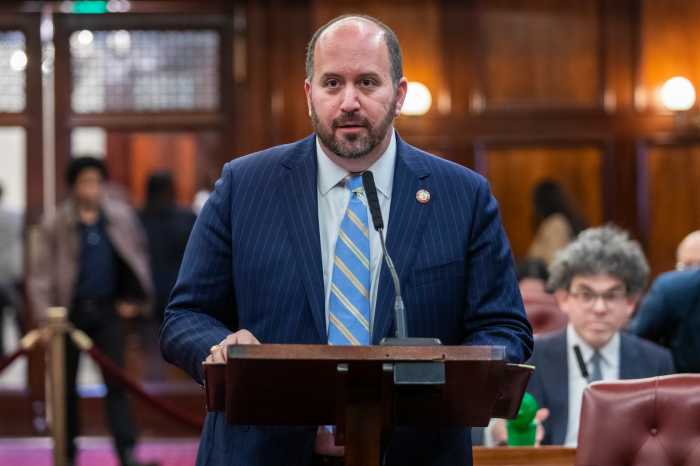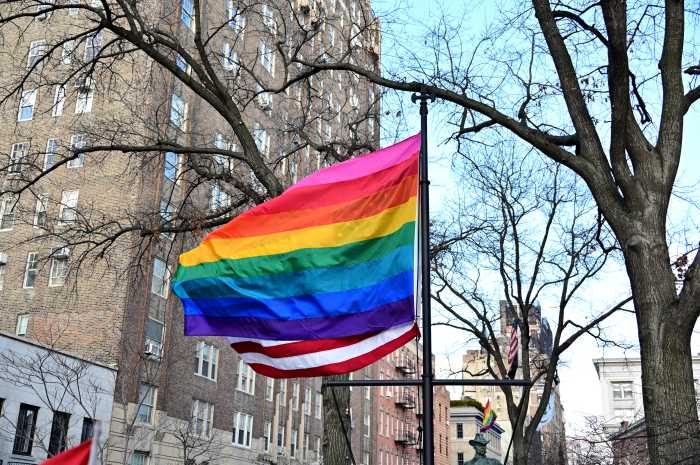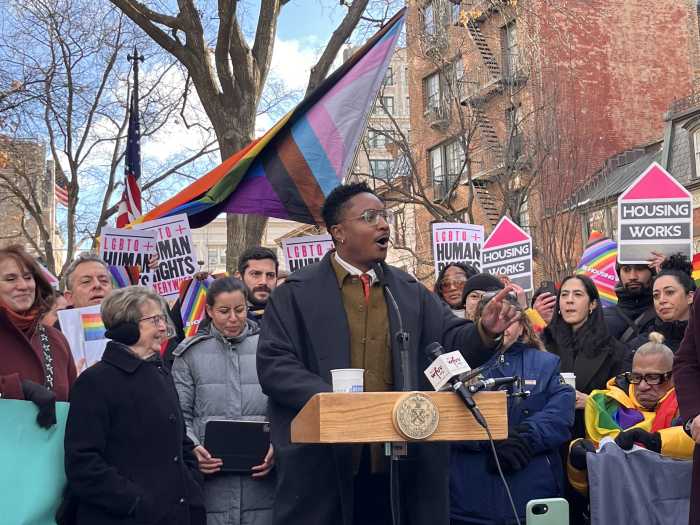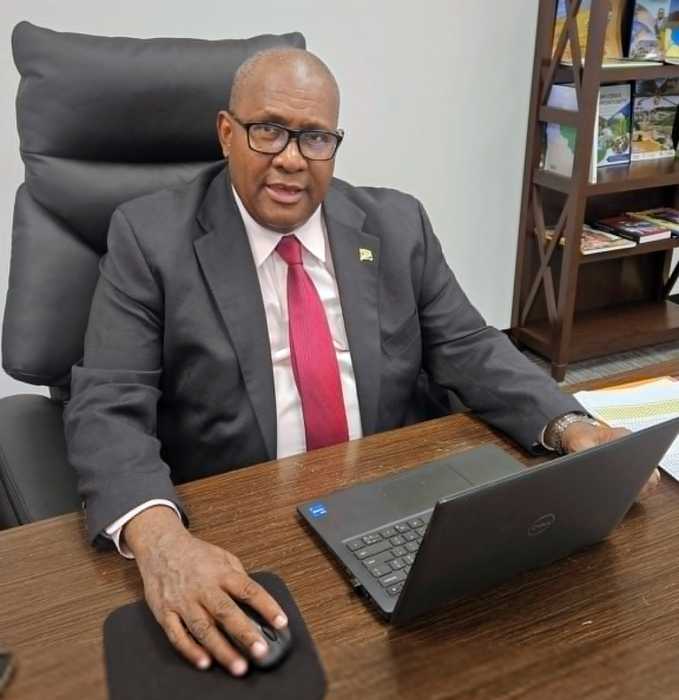A participant in the May 24 picket targeting Jamaican Prime Minister Portia Simpson Miller at Lafayette College in Easton, Pennsylvania. | CARIBBEAN ALLIANCE FOR EQUALITY
Protests against Jamaican reggae dancehall artists who profit from violent anti-gay songs branded “murder music” and engage in other homophobic provocations intensified in recent weeks in New York.
On May 23, Jamaica Anti-Homophobia Stand (JAHS) and City Councilman Daniel Dromm, an out gay Jackson Heights Democrat, picketed the Amazura Concert Hall in Jamaica, Queens demanding the cancellation of an appearance by Queen Ifrica, who in a 2010 performance told the crowd, “We are not going to legalize any faggotism in Jamaica.”
Dwayne Brown, founder of JAHS, said in a release, “Queen Ifrica’s words help create a climate where human rights violations against LGBT Jamaicans are rampant.”
In the US and at home, activists from the island nation respond to anti-gay violence, artists who voice hate
In a written release, Dromm said, “Queens has historically been a haven for marginalized people around the world, including LGBT Jamaicans who have had to flee their country. I am proud to join with these brave activists who are using the freedom they have in this country to continue to fight for the embattled LGBT community in Jamaica.”
The May 23 performance was canceled by club manager John Rios, who told the Jamaica Observer, “We’re not prejudiced against anyone. I welcome the gay community and we get along with everybody.
Queen Ifrica lost her status as a UNICEF ambassador due to her 2010 anti-gay outburst but “has continued to use her performances to advocate for the criminalization and persecution of LGBT Jamaicans,” a JAHS release said.
Brown told Gay City News, “She went to Canada and activists got her concert canceled and her work permit was pulled. So she has been trying to get work here in America.”
In a YouTube video posted June 7, Queen Ifrica called her gay opponents “bullies” and said she wished “black people got the same tolerance as gay people.” She then challenged the gay community to “bring out the pedophiles among them.”
JAHS, joined by the Caribbean Alliance for Equality (CAFE), was unsuccessful in picketing reggae artist Capleton at B.B. King’s in Times Square on May 28. A small group picketed the club over such Capleton lyrics as “Yo Batty a Dead Man Dem” (colloquial for “gay men must die”), “Bun Out Di Chi Chi” (“burn all gay men”), “Boom Blast Riddim” (“shoot all gay men”), and “Hang Dem Up” (“hang all gay men”). But a club rep told Gay City he had not been aware of the controversy and would not cancel the concert. The venue succeeded in getting more police to turn out than demonstrators.
Outside the club, a fan of Capleton’s named Simone first told Gay City News, “His views are not my views, but he’s a good artist. It doesn’t matter what he is singing about.” She then said, “Most of his anti-gay lyrics were from 2008 and before. None of his modern lyrics have anything anti-gay.
Brown said that Capleton has continued to sing anti-gay songs “in local concerts in Jamaica” often in a patois only understood by locals, not his fans in the United States. In an email message, Brown also noted that, in other circumstances, “Capleton’s fans know the lyrics of his songs. So if he sings a ‘kill LGBT’ song, but leaves out the ‘kill LGBT’ lines his fans still are reminded of the message and get the message.”
Capleton signed the Reggae Compassionate Act in 2007, pledging to ditch the anti-gay songs, but promptly violated it.
The LGBT groups intend to keep the pressure up on venues that book Capleton, whose “murder lyrics… have been used to torture and murder innocent LGBTQ persons in Jamaica,” said Jason Latty, founder of CAFE.
The group has also protested several US appearances by Jamaican Prime Minister Portia Simpson Miller, who has reneged on bringing up a bill to repeal anti-sodomy laws there. CAFE picketed the graduation ceremony at Lafayette College in Easton, Pennsylvania on May 24, where Miller was awarded an honorary degree for having “championed the rights of women, minorities, and impoverished people,” according to a college release.
On May 24, Jamaican gay activist Kenrick Stephenson was shot to death outside his Montego Bay home. Jamaica Forum for Lesbians, All-Sexuals and Gays (J-FLAG) said though he was not a member of the group, it was aware of his activism. In a statement, J-FLAG urged police “to conduct a speedy investigation.” Thus far, no arrests have been made in the case and police are not saying whether they believe homophobia was a factor.
CAFE held a demonstration in Union Square in Manhattan on June 8, “pleading with the government to ensure that hate crimes against the LGBT community are investigated and the perpetrators brought to justice,” according to the group’s release. “We asked also that the public and persons in authority show some restraint and good judgment when discussing sexuality. We strongly believe that when members of the clergy and other sectors of the society make baseless and fact-less statements like all gays are pedophiles; gay rights will lead to heterophobia; and the church is under attack by the gay lobby, it increases the likelihood of these hate crimes, that put the LGBT community’s lives at risk and make Jamaica less safe.”
Dr. Keon West, a psychology professor at Goldsmiths, University of London, wrote in the UK Guardian on June 6 about a study he conducted on Jamaican homophobia with Dr. Noel Cowell from the University of the West Indies using data that Cowell’s colleague, Professor Ian Boxhill, collected from 2,000 Jamaicans in 40 communities there. The researchers found “strong prejudices against gay men and lesbians,” though less among wealthier, educated, and younger people. Homophobia correlated with religiosity, the authors concluded, but the most reliable predictors of homophobia were “a preference for dancehall music” and being male.
“This research provides the first empirical evidence that these songs may be harmful, leading to more negative attitudes and anti-social behaviour,” West wrote.
He concluded, “The good news is that work is finally being done in Jamaica, by Jamaicans, to tackle this aggressive policing of heterosexuality. And this is integral for change to happen; more than we need Western intervention, we need Jamaicans who are ready to take the initiative.”




































